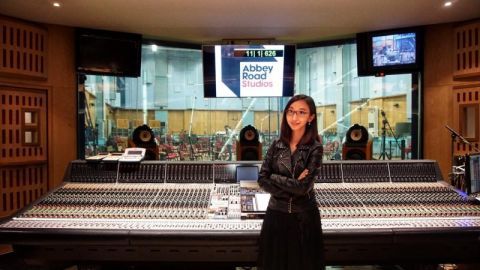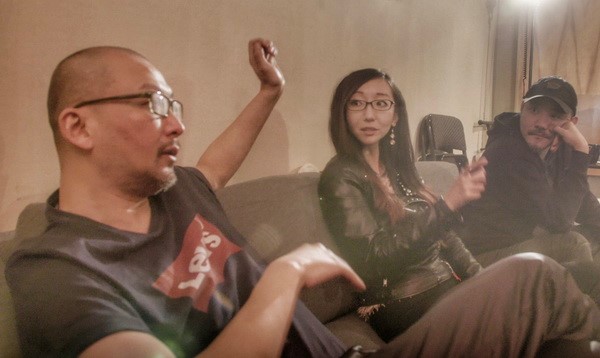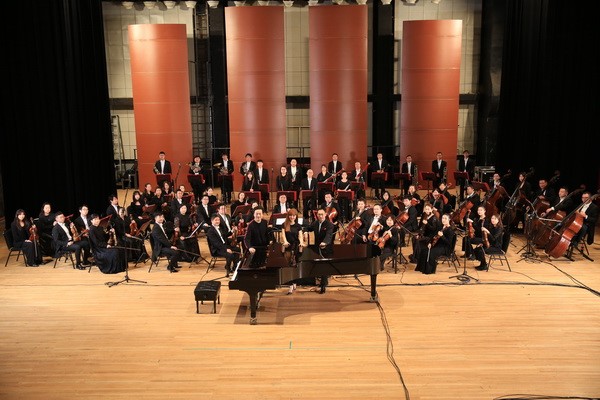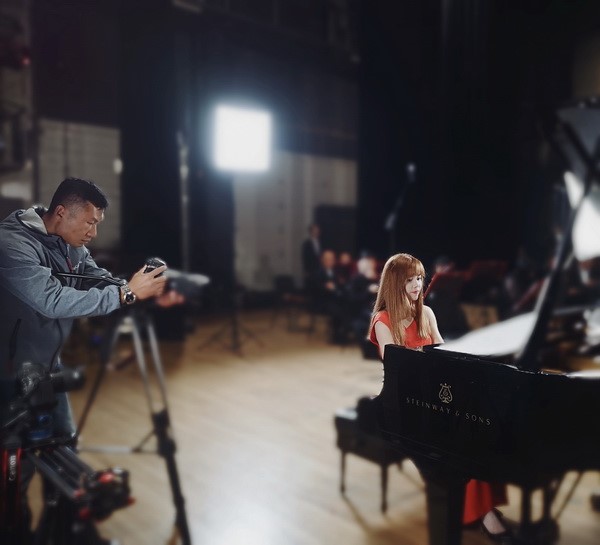---Originally published on The Paper
In the film My People, My Country, prominent pop singer Wang Fei sang a theme song under the same title; this year, the sister film My People, My Homeland adapted My Motherland, the theme song of the famous classic film Battle on Shangganling - the film title begin with the singing of various stars, while the original classic song by the well-known singer Guo Lanying is inserted in the closing credits. Another example is The Captain. The film adapted I Love the Blue Sky of My Motherland created by prominent dramatist and lyricist Yan Su in 1962, re-sung by the famous singer Mao Aimin in a more romantic manner. The sensitive audience may have already perceived a new trend: those classic songs from older times are gradually ushering in their “second spring”, and have been gradually revisited for the purpose of contemporary adaption.
This trend in the film may have started from Youth, a film directed by Feng Xiaogang in 2017. In the film, which explicitly carries a distinct nostalgic tribute to the author of the original work, the prominent singer Han Hong re-singsTasseflower - the theme song of the film Xiaohua in 1979, which was sung by Li Guyi and rated as the “favorite broadcast song among the audience” in 1980. Such an “old song, new voice” mode is not rarely seen in the film industry. However, Youth represents a starting point for a trove of subsequent films adopting the same method.
With its shooting starting this August and opening on October 23, The Sacrifice is a film produced on a tight schedule despite heavy workloads. Similarly, according to a report of Popular Film dated in April 1956, the preparation team of the Battle on Shangganling hadn’t been established until January of the year, and the film “was prepared, produced and opened all in the same year”. Yu Fei, music director of The Sacrifice, told the journalist of The Paper that they once considered using the original theme song of the Battle on Shangganling - My Motherland, but “after discussion, everybody agreed that the Ode to Heroes, the theme song of Heroic Sons and Daughters, was more aptly suited to the spirit and quality of the film.” No matter which one of the two options, the film score of The Sacrifice represents the first time that the inheritance and re-interpretation between the old and new films, with the same heights and similar genres, have been achieved in this “old song, new voice” trend.
Yu Fei, the music supervisor of The Sacrifice, previously collaborated with Guan Hu, the director of The Eight Hundred, on the film score, where she adapted the Irish ballad Londonderry Air into the ending theme Remembering, somewhat counting as an “adaption of foreign things into Chinese use” in this trend.
Upon receiving the invitation to play the Ode to Heroes, the theme song of The Sacrifice, the pianist Chen Sa was on a performance tour in Nanjing, “My mother was born in 1953, when the War to Resist US Aggression and Aid Korea had already been won. My great grandfather gave her the pet name ‘Yuanli’, which means the ‘victory of the war to aid Korea’. My mother was beside me when I received the invitation, and she said to me, ‘since you are a descendant of soldiers, you are duty-bound to this mission.’” Chen Sa told the journalist of The Paper that she had seen the black-and-white film Heroic Sons and Daughters in her childhood and was very familiar with the melody of the Ode to Heroes, “as soon as I received the demo, my memory was instantly aroused by the melody, as if it had unconsciously existed in my mind. ”
Chen Sha explained that the task was completed in extreme urgency, but as a musician, she felt that the music spoke for itself. “Generally, I consider it a highly successful adaption - different parts are well aligned to the vocal and instrumental languages played by the violin and piano, in addition, each solo also presents the tenderness side of the role.” She explained that the performance of the piano starts immediately after the cappella vocal and runs throughout the entire music to assume different roles. “It carries some tonal colors with it. Some are sonorous chords that are so strengthful that they sound like a horn in terms of the ostinato; some are like triplets of flowing water. It isn’t until the solo of the third paragraph that a gracious cantabile melody starts to emerge. The entire music ends with a passionate, affirmative march, which is highly aligned with the spirit and quality intended to be conveyed by the film.”
In her communication with the journalist of The Paper, music critic Miya said that the theme song of The Sacrifice was very impressive. “The cappella vocal, generally speaking, arouses a sense of awakening; the melody played by the violin sounds brighter, which is in line with the tonality produced by the high-frequency band of the instrument; in the meantime, there are actually many euphonious parts created by piano-playing, but as the entire polyphony is interwoven with the orchestra, the audience may not be able to have a clear distinction. Actually, it works to build up the entire atmosphere - the piano solo appears when all sounds arrive at a small climax, making it a more cordial narrative. It also has a small ornament to add a flavor of an original ballad to it.”
Similar to Chen Sa’s acceptance of the performance mission because of the memory and entrust of the precedent generation, Yu Fei, the music producer, posted the following words on social media on the day when the MV of Ode to Heroes was officially released: “In the many songs and film scores that I've worked on, I have met many difficulties, big or small. But none of them had more difficulties to overcome than this one. Whenever I encounter a difficulty, I would think of my grandpa, who was one of the first pilots flying IL-10 to Korea to contribute his own part. I wanted to dedicate this song to my grandpa because he is also one of the most beloved people!” Recently, Yu Fei accepted an inclusive interview with The Paper in Beijing.

A good grasp of revolutionary vigor to convey tribute and remembrance
The Paper: Tell me about the film score of The Sacrifice. Why did you choose to re-interpret the Ode to Heroes, the theme song of the Heroic Sons and Daughters?
Yu Fei: In the beginning, when we started to brainstorm ideas, we also considered referencing My Motherland, the theme song of Battle on Shangganling, because the song is relatively more calming, and I was planning to invite Ma Youyou, a cellist friend of my supervisor, to play it. But later we felt that the Ode to Heroes was more aptly suited to The Sacrifice in terms of the sentiments of the film.
The copyright of the Ode to Heroes is currently owned by composers Liu Zhi and Gong Mu. They set very strict requirements on the adaption and prohibit any personalized changes. So I hoped that some new breakthroughs, or new presence, of the song could be achieved by adopting an interactive, cross-domain mode integrating pop + classic performance.
The Paper: This time, the theme song of the film Ode to Heroes is sung by Tan Weiwei. Can you explain why she was chosen as the singer?
Yu Fei: With respect to the selection of the singers, we eventually decided, after discussion, to grant the opportunity to relatively younger singers because those who are familiar with the song are mostly old-timers. The post-80’s generation may have some impression about the song, while the post-00’s generation are basically ignorant of it. Ode to Heroes is a song that is very difficult to sing well, in terms of either register or vigor, posing high requirements on a singer's vocal prowess. Tan Weiwei has previously sung the Huayin Laoqiang Opera, which left me and Liu Yunyun, daughter of Liu Zhi, a deep impression. As a “spicy” girl from Sichuan, she can be both tender and aggressive. I hoped that she was able to not only grasp the revolutionary vigor of the original singing, but also convey the tribute and remembrance of today's people to heroes in her performance.
The reason why we invited her to do cappella singing of the verse had much to do with what I saw from the footages about the War to Resist US Aggression and Aid Korea sent to me by director Guo Fan - these black-and-white images were so brutal that it just went beyond our imagination on the cruelty of war. In addition, the film intends to convey the message that “every bit of the sacrifice was worth it”, so cappella singing goes a long way in sending the respect. The chorus features group singing; many leading actors were invited to take part in the chorus, and you can see them from the MV.
Yu Fei: You know I started to learn piano at the age of 3, so I am quite familiar with prominent pianists both from home and abroad. Chen Sa, as the first Chinese female pianist to win awards at the highest-level piano competition in the world, is reported to serve as a judge in the International Chopin Piano Competition next year. You know, there are few women pianists who have won international awards. The fact that she is the first one to do indicates her prowess in performance. I am a big fan of her performance style not only because of her talents, but because I admire her persistence in her day-to-day profession. The recent years have also seen the rise of public debate on women’s power. In my personal encounter with her, I can feel her unyielding personality and I feel that she is able to perform the song with both tenderness and rigidity, making it breathtakingly captivating.

It was my original thought to find a pianist and a violinist. The verse would be performed by three persons: a singer and two instrument players, while the chorus would be implemented by all artists. Needless to say, Lv Siqing enjoys a paramount position in the field of the violin. Ode to Heroes is a song that was created in the 1960s. To deliver better performance, he deliberately took a time-honored instrument with a history of 300 years to the rehearsal site, and it struck all of us as soon as the music was played on it. I hoped that both the violin and the piano could convey the sentiments of tenderness and rigidity so that the audience may perceive a hidden power in it, and we held the same thought as early as in the composition stage.

The “first” music supervisor/director in China’s film history
The Paper: Can you briefly introduce yourself? And explain why you were so interested in film scores that you made it your career.
Yu Fei: I've learned music since my childhood. I often went to recording studios to record piano playing, where I gained a familiarity with the work of recording engineers. Perhaps it was at that time that I started to think about my career. Later, I was admitted to the Recording Department of Beijing Film Academy, where I majored in the Recording and Creation of Film and Television Music. Therefore, I’ve also been learning knowledge and techniques about composition. After graduation, I served at the China Film Group Corporation, where I was responsible for music recording and sound editing, and contributed to music editing for major works like Let the Bullets Fly.
At the time, Dolby Atmos was just introduced to China and most practitioners were not quite familiar with the format. Thus, I decided to quit my job and pursue overseas studies with a view to learning some of the newest technologies. I went to McGill University in Canada, the best university in the field of music recording in North America, which is also the alma mater of Norman Bethune. Later, I started to win international awards for music recording, such as the 137th and 138th AES Music Recording Gold Awards.
The Paper: I’ve noticed that in your recent works, such as The Eight Hundred and The Sacrifice, your title is music supervisor/director or music producer, can you tell me what similarities and differences between these positions and music editing?
Yu Fei: Originally, music editing wouldn't begin until the last stage of film production. The music editor could not get the music and start editing until it was composed. At this moment, the editor would raise tons of requirements, such as changing the rhythm or melody of the score, but the problem should be addressed during the composition stage and there was not much that a music editor could do in the end. For example, in many projects, a publicity or theme song that was brought forth abruptly was required to be embedded into the film, but the score had already been done. Then you needed to rack your brain to find a way to insert it into the film, and in the meantime, address some copyright issues. In a word, if there isn't a person responsible for coordination and planning in the very beginning, then the post-production stage would go problematic, which will eventually delay the progress of film production.
At that time, I thought that it would be better if I assume the position of music supervisor to oversee film scores from the beginning to the end. After returning to China from overseas studies, given my previous experience at China Film Group and my connection with many directors and their studios, many of them started to ask me whether I was willing to help them with film scores. My first project as a music supervisor was Go Away, Mr. Tumor, and my name “Music Supervisor: Yu Fei” appeared at the closing credits. In films of The Eight Hundred and The Sacrifice, my title was “music supervisor”, which appears in the opening and closing credits.
The Paper: When was the position of “music supervisor” official set up in the Chinese film industry?
Yu Fei: I should be the “first” music supervisor/director in China’s film industry, because there was only the concept of “composer” in previous Chinese films. In the overseas market, the position of music supervisor appeared a long time ago. Previously when I worked with director Lu Chuan on the documentary Born in China, a project partnered with Disney, the role of music supervisor had already appeared in their creation team.
In foreign countries, the position originally entailed responsibilities like helping the production crew handle music copyright issues. However, the roles and responsibilities of a music supervisor started to grow over time. In some way, the person needs to assist the composer to fulfill all his designs if the budget permits. Many people tend to associate music supervisors with a leading role, which is actually not accurate. My responsibilities are complementary to those of the composer. I need to coordinate with all issues related to film music, such as what songs should be put in what position, how to ensure a smooth transition between them with the film score, how to clear copyright issues for the production crew and how to fulfill creations with intended artistic achievements.

In earlier times when China’s film industry has yet to reach an international industrialized standard either in terms of budget or design, little attention was paid to copyright issues. However, recent years have seen directors starting to hire world-renowned composers. Regardless of the final performance, it has indeed produced a possibility of horizontal comparison in the industry, as well as higher diversity. Greater attention has been paid to film music and the awareness of copyright has also been growing.

In The Eight Hundred, copyright has been purchased for many unnoticeable scores.
The Paper: As you mentioned, the current film industry has been giving increasing attention to film music, particularly the copyright, can you give some examples?
Yu Fei: Take my own work, for example. At least I can responsibility say that we have cleared copyright issues in all film scores that I’ve worked on. This is true for both The Eight Hundred and The Sacrifice. These films both utilize music with copyright owned by other parties, especially The Eight Hundred. That includes The Nightingale sung in the film by a female Russian singer at the south bank of the Suzhou River, the Pingtan appearing in the funeral at the back alley, the jazz music played on the phonograph in the room of Sister Rong (played by Liu Xiaoqing)... These pieces may be presented in clips, as background sounds or as operas on the stage. Many music pieces are not conspicuous to the listener, and even the director himself didn't intend to draw the audience's attention towards the details of the scores, we nevertheless cleared their copyright issues.
The Paper: The employment of film scores is not baseless, for example, you mentioned the traditional operas in The Eight Hundred, the lines in the opera Tiaohuache actually form intertextuality with certain film plots.
Yu Fei: Yes, the traditional opera in The Eight Hundred also functions as a part of the narrative. We found an aria in line with the director’s intention and re-recorded it by incorporating considerations of stage performances. Another example is the Shanghai coupled played by Liang Jing and Hou Yong. The scene where Shanghai ladies are playing mahjong in the room was accompanied by an old Shanghai song. We exclusively conducted research of songs prior to 1938 and selected a piece of Jazz music created before 1937. The song Nightlife in Shanghai, perhaps, is quite familiar to people, but it didn’t appear until the end of the Battle of Shanghai, so it could not be used.
The Paper: Personally, I am very interested in the application of Danny Boy in the film, which is an Irish ballad supposedly written by a father to his son who is going off to war, which is very touching. I noticed that the song appears multiple times in the film, and even adapted with new lyrics into Remembering, which is sung by Na Ying and Andrea Bocelli.
Yu Fei: All scores in the film were designed jointly by me and the composer. During the shooting of the film, we used Londonderry Air, upon the recommendation of the military advisor hired by the crew, which is performed by a soldier with harmonica. That is because the Chinese defending troops were a division armed with German equipment and had been stationed in Shanghai since 1931. The officers had received German military training, and their stationary place was surrounded by foreign settlements in Shanghai. Supposedly, we would be exposed to popular culture from Europe and America. That was why we wanted to use the song to highlight the specialty of the troop, because their qualities and horizons were certainly different from those of the local security regiment.
After the harmonica performance of the ballad, I found that it appeared only once in the earlier part of the film. So there was a lack of inclusion, which was quite regretful because the homesickness conveyed by the music was highly resonant for the defending troops. If the music can be applied again, I wanted to make it a female cappella – I had long expected to make a piece of pure vocal music, without accompaniment at all. That is because The Eight Hundred is a very tragic story and the audience may feel depressed during the appreciation process. They need an outlet to vent their emotions. We hoped to create a clear voice at the end of the film so that emotions can be released.
The Paper: But in the end what we hear is a duet between Na Ying and Andrea Bocelli.
Yu Fei: This is the decision of collective discussion. We found it may appear flimsy if the song is just sung in a female voice, and better effects can be created if we can vent the emotions at their heights. That was why we considered a duet. We hoped that it brings a feeling of two singers singing across the Suzhou River to reflect a sense of dialogue. In the film, in fact, the south bank of the Suzhou River is the British Settlement, where many foreign settlers, including diplomatic missions and journalists, lived there. In some sense, they were also passively involved in the war. The film is also intended to convey international justice and the humanistic spirit. We didn’t want to limit the work to the Chinese circles right from the start, as the film would definitely be shown on international occasions. We hoped that more people could become aware of the history through seeing the film.

In her singing, Na Ying refrains from letting her voice elevate as if she is narrating. She has somewhat a hoarse voice, particularly suitable for storytelling. At that time, our requirement for her was to sing the song in the form of narrating. Bocelli, on the other hand, is a world-renowned singer, who has an impelling and penetrating voice. In the film, his singing functions as a call. We changed the tonality for him and he immediately brought it out perfectly. What I want to emphasize is that both of them are highly devoted artists. The recording was implemented at different locations. For this reason, Na Ying recorded her singing twice. In order to collaborate with the voice of Bocelli, she went into the recording studio again and strove to achieve perfection.

Films are closely associated with film music
The Paper: Can you talk about the foreign film music composer who has the biggest influence on you. Is it Ennio Morricone who has just passed away?
Yu Fei: The composer who has the biggest influence on me is definitely Ennio Morricone. That is because many classic film scores in the film industry were created by him, such as The Legend of 1900 and Cinema Paradiso. For a film music enthusiast like me, he is a man that can never be overlooked. Of course, John Williams also has a significant influence on me. As a figure living in the same era as Morricone, he has pioneered the application of large-scale symphonic poems in film scores. The films that he contributed to, including Jurassic Park and Star War, are perfect examples of such an application. Another big influencer is Hans Zimmer, who successfully brings the combination of electronic music and symphonic music to its paramount, such as in Dunkirk, Pirates of the Caribbean and the earlier film Pearl Harbor.
The Paper: How do you find the scores in currently released films, including No Time to Die, a 007 film that is delayed once again for release?
Yu Fei: The theme song by Billie Eilish under the same title of the film has already been released. I’ve listened to it and found it fairly good. But the singing is not as stunning as the Skyfall sung by Adele, nor does it deliver the same breakthrough as songs co-created by her and her brother. However, her partnership with Hans Zimmer in a cross-domain attempt is inspiring for us. The 007-series is a time-honored IP, and the developments in the series in recent years have been aimed to attract young audiences. Thus, our producer is highly attentive towards the directions of the music market. From the perspective of film scores, the earlier Jazz style pioneered by John Barry to Hans Zimmer this time have been major trends backed by influential artists. The same trend can also be seen in the performance of theme songs – partnered singers have invariably been winners of the Grammy Awards. Basically, whoever is popular gets the contract. Despite the fact that the spy 007 admits that he is old in the film, the marketing approach of the film by itself is something new. They hope that the film can be carried forward through iterative measures, which is also evidence that films and film music are closely connected with each other.
The Paper: In the documentary Born in China we just mentioned, the score of the film, to my mind, is a perfect example of “Chinese and foreign integration”, can you give us some comments?
Yu Fei: Admittedly, Disney has attached great importance to film score development. Although a foreign composer was hired when working on such a Chinese genre film, they still managed to learn the traditional Chinese five-tone and seven-tone modes, as well as the rhythms of some Chinese music, which were subsequently applied not only to Chinese musical instruments. As a matter of fact, the composer is very good at creating music for humanistic documentaries, the director Lu Chuan found his music somewhat unsatisfactory as it sounded a little irrelevant. I was caught in the middle and had to do all the coordination, telling the composer the music did not necessarily have to be stringed and woodwind music, and the music shouldn’t steal the show to draw the audience out of the film. Later, we had a discussion and decided to use different instruments to express the personalities of different animals. Three different themes revolving around pandas, golden monkeys and snow leopards were set. Instruments employed included flutes nd dulcimers, with the former taking a dominant role; we also used some percussion instruments and erhu. However, the instruments were not limited to just Chinese instruments, for example, the cello was applied in the snow leopard theme.
The Paper: I also noticed that you’ve won some international awards in film recording. Have you ever participated in some overseas film projects?
Yu Fei: When I was abroad, I mainly recorded musical records. For films, I had an opportunity to cooperate with Disney in projects where I basically serve as the Chinese music advisor. During the preparatory stage of Mulan, I offered an internal training session about Chinese music, where I explained Chinese music elements. I believe that the so-called “Chinese elements” do not have to be performed by traditional Chinese instruments. It depends on the music itself and its connotations. Also, Mulan is a story adapted from a folk song in the Northern Dynasty. So I pointed out some instruments hadn’t been invented at that time and it was better not to use them. Later I learned that it is a magical genre movie instead of serious history, so some doctrines are not necessarily observed.
I also provided them with some useful thinking, for example, about the background music for scenes of a vast desert. Also, in combination with historic geographic and humanistic observations, I recommended that some folk music instruments, such as the matouqin could be used.
They really did not have to be guzheng, erhu or pipa, as stereotyped thinking of foreigners would suggest when Chinese music or instruments are mentioned.
